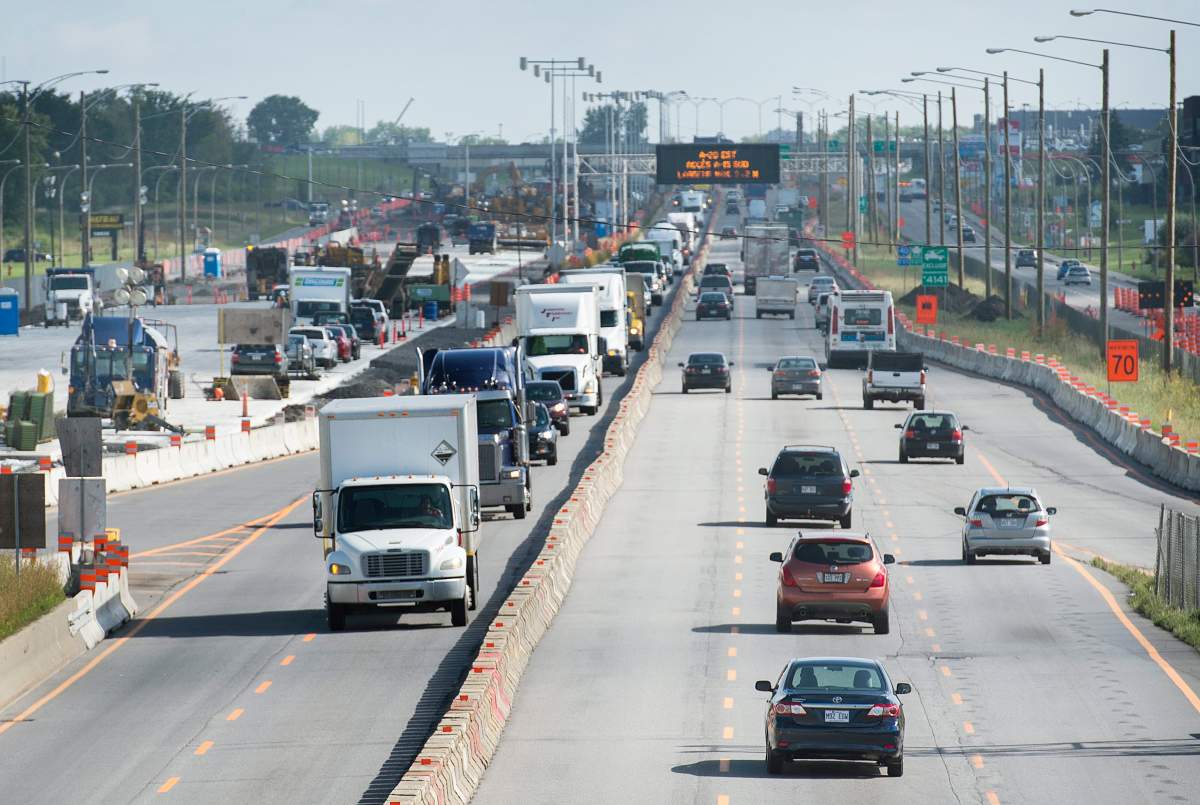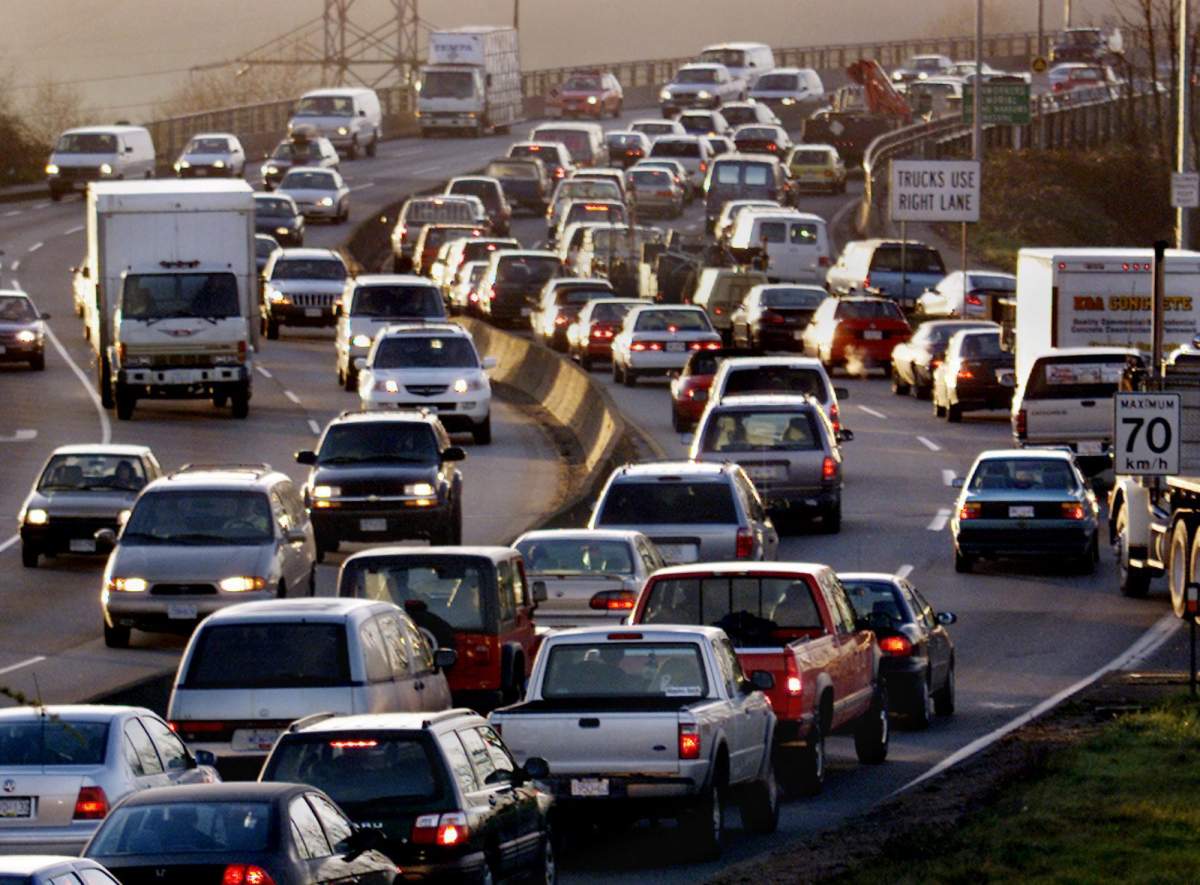Montreal and Toronto drivers have been known to spend as long as 52 and 45 peak traffic hours in congestion in a single year, respectively.

That’s more time spent in traffic than in any other Canadian city, according to one study.
But both cities nevertheless rank among the world’s 20 best places to drive in based on another study released by German online car parts company Kfzteile24 on Wednesday.
Coverage of congestion in Canada on Globalnews.ca:
The survey included five Canadian cities in total.
Of those, Calgary had the best ranking, coming in at 10th-best place to drive in the world.
But Montreal wasn’t far behind with a 13th-place ranking, followed by Toronto at 14th place. Ottawa ranked 22nd, Vancouver 48th.
READ MORE: Canada’s worst cities for spending hours and hours in traffic
Kfzteile24 came up with its rankings by looking at 500 cities that had the highest number of registered vehicles, according to its website.
The company then looked at the cities that had the most available traffic data and narrowed its list down to 100 places.
It considered nine different factors when ranking the cities themselves, and assigned each of those factors a different weight.
They included congestion levels (30 per cent), which was derived from data in the TomTom Traffic Index. Where TomTom data wasn’t available, Kfzteile24 used information provided by city councils in different cities.
Other factors included speed (15 per cent), which was calculated by looking at average speeds for the morning rush hour, midday and the evening rush hour, between the city centre and an international airport. Those speeds were then averaged to provide a score.

Get breaking National news
WATCH: Canada’s first ‘diverging diamond interchange’ now open to traffic

The price of gas (five per cent) was another factor, and this was determined by looking at information from gas stations that was taken Aug. 18.
READ MORE: 4 Metro Vancouver roads make list of top 20 worst traffic bottlenecks in Canada
Of the Canadian cities on the list, Vancouver had the lowest ranking at 48th place. Its congestion was observed to be the worst of all of them, with a score of 39 per cent — the very same one in the TomTom traffic index.
The score means that Vancouver drivers expect to spend an average of 39 per cent more travel time stuck in traffic at any time of the day.
But that finding contrasts with conclusions reached by traffic analytics company INRIX earlier this year.
INRIX’s study arrived at its rankings by using real-time GPS data as well as traffic flow information from over 1,000 cities.
It ranked Montreal (52 hours) and Toronto (45.6 hours) as producing the most peak hours spent in congestion, followed by St. John’s, N.L. (31.8 hours), Ottawa (31.5 hours) and Vancouver (30.4 hours).
In a statement, Ricky Sutton of ABCD Agency, a PR firm working with kftzteile24, put it down to a difference in methodology: he noted that the TomTom data it used in its survey looks at overall travel times, while INRIX’s research looked at congestion at peak times.
READ MORE: 4 Metro Vancouver roads make list of top 20 worst traffic bottlenecks in Canada
Robin Lindsey, a UBC business professor who focuses on traffic congestion, said kftzteile24’s rankings look plausible “on the surface.”
“My guess is that Montreal and Toronto are indeed decent places to drive compared to many other cities,” he told Global News.
But he also said that TomTom data, which this survey used to gauge congestion, has limitations.
Lindsey said TomTom measures congestion “as a percentage increase over free-flow conditions” – say, if a commute that took 20 minutes under ideal conditions actually took 30 minutes, then TomTom’s index would be 50 per cent.
But free-flow travel times can be higher in cities like Toronto than Vancouver, making congestion delay longer in Toronto, even though in the TomTom index, it ranks lower than Lotusland.

Free-flow speeds also differ by city, he said.
“In Vancouver, they are relatively low because of bridges, hills and narrow roads,” Lindsey added.
In any case, he said Kftzteile24’s criteria for judging drives in different cities makes sense, adding that “most if not all” of the factors it uses could improve in the coming years.
Autonomous vehicles, for example, could potentially bring less congestion because time in a car could be “usefully spent.”















Comments
Want to discuss? Please read our Commenting Policy first.